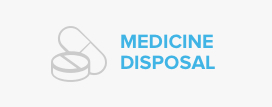Take Action
In Your Home | In Your Community
Properly Dispose of Hazardous Waste
Household hazardous waste (HHW) is any material that can harm our environment when it’s not handled properly. Common examples of household hazardous waste include turpentine, fuel, coolant, batteries, pesticides, herbicides, cleaners, paints, and even electrical devices. Help eliminate environmental harm by reading warning labels and disposing of hazardous products properly. If you don’t, these household hazardous waste products can contaminate septic tanks, pollute the environment, and pose a threat to overall human health.
The East Richmond Road Convenience Center at 3800 East Richmond Road accepts household hazardous waste from 7:00 am to 3:30 pm on weekdays, and from 8:30 am to 2:00 pm on Saturdays. Learn more about how to dispose of hazardous waste here.
A few easy tips to remember:
DO:
DON'T:
Stop the FOG
Liquified fat, oil, and grease (FOG) that are poured down sink drains can cling to the insides of pipes and sewer systems, causing sewer blockages and backups known as “fatbergs.” According to a 2014 study, FOG is the cause of 47% of sewer overflows in the United States annually. Grease buildup can also harm your wallet – plumbers can charge hundreds of dollars to simply unclog a drain.
The simple solution is also the best: Keep our sewage system clear and our waterways clean by disposing of cooking oil and grease responsibly.


